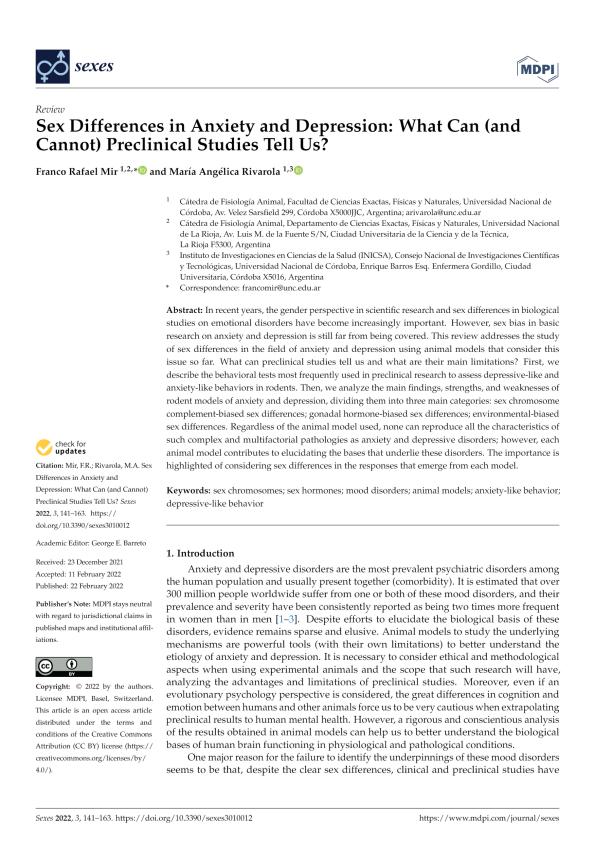Mostrar el registro sencillo del ítem
dc.contributor.author
Mir, Franco Rafael

dc.contributor.author
Rivarola, María Angélica

dc.date.available
2024-01-16T16:03:38Z
dc.date.issued
2022-02
dc.identifier.citation
Mir, Franco Rafael; Rivarola, María Angélica; Sex Differences in Anxiety and Depression: What Can (and Cannot) Preclinical Studies Tell Us?; MDPI; Sexes; 3; 1; 2-2022; 141-163
dc.identifier.issn
2411-5118
dc.identifier.uri
http://hdl.handle.net/11336/223840
dc.description.abstract
In recent years, the gender perspective in scientific research and sex differences in biological studies on emotional disorders have become increasingly important. However, sex bias in basic research on anxiety and depression is still far from being covered. This review addresses the study of sex differences in the field of anxiety and depression using animal models that consider this issue so far. What can preclinical studies tell us and what are their main limitations? First, we describe the behavioral tests most frequently used in preclinical research to assess depressive-like and anxiety-like behaviors in rodents. Then, we analyze the main findings, strengths, and weaknesses of rodent models of anxiety and depression, dividing them into three main categories: sex chromosome complement-biased sex differences; gonadal hormone-biased sex differences; environmental-biased sex differences. Regardless of the animal model used, none can reproduce all the characteristics of such complex and multifactorial pathologies as anxiety and depressive disorders; however, each animal model contributes to elucidating the bases that underlie these disorders. The importance is highlighted of considering sex differences in the responses that emerge from each model.
dc.format
application/pdf
dc.language.iso
eng
dc.publisher
MDPI
dc.rights
info:eu-repo/semantics/openAccess
dc.rights.uri
https://creativecommons.org/licenses/by/2.5/ar/
dc.subject
sex chromosomes
dc.subject
sex hormones
dc.subject
mood disorders
dc.subject
animal models
dc.subject
anxiety-like behavior
dc.subject
depressive-like behavior
dc.subject.classification
Otras Ciencias de la Salud

dc.subject.classification
Ciencias de la Salud

dc.subject.classification
CIENCIAS MÉDICAS Y DE LA SALUD

dc.title
Sex Differences in Anxiety and Depression: What Can (and Cannot) Preclinical Studies Tell Us?
dc.type
info:eu-repo/semantics/article
dc.type
info:ar-repo/semantics/artículo
dc.type
info:eu-repo/semantics/publishedVersion
dc.date.updated
2024-01-15T14:40:34Z
dc.journal.volume
3
dc.journal.number
1
dc.journal.pagination
141-163
dc.journal.pais
Suiza

dc.journal.ciudad
Basel
dc.description.fil
Fil: Mir, Franco Rafael. Universidad Nacional de Córdoba. Facultad de Cs.exactas Físicas y Naturales. Departamento de Fisiología. Cátedra de Fisiología Animal; Argentina. Consejo Nacional de Investigaciones Científicas y Técnicas; Argentina
dc.description.fil
Fil: Rivarola, María Angélica. Universidad Nacional de Córdoba. Facultad de Cs.exactas Físicas y Naturales. Departamento de Fisiología. Cátedra de Fisiología Animal; Argentina. Consejo Nacional de Investigaciones Científicas y Técnicas. Centro Científico Tecnológico Conicet - Córdoba. Instituto de Investigaciones en Ciencias de la Salud. Universidad Nacional de Córdoba. Instituto de Investigaciones en Ciencias de la Salud; Argentina
dc.journal.title
Sexes
dc.relation.alternativeid
info:eu-repo/semantics/altIdentifier/doi/https://doi.org/10.3390/sexes3010012
Archivos asociados
